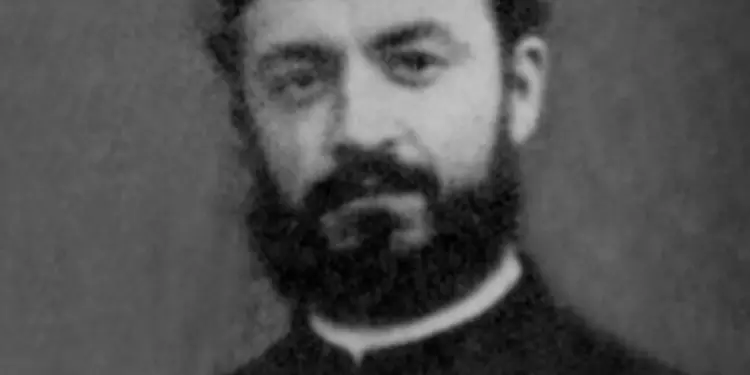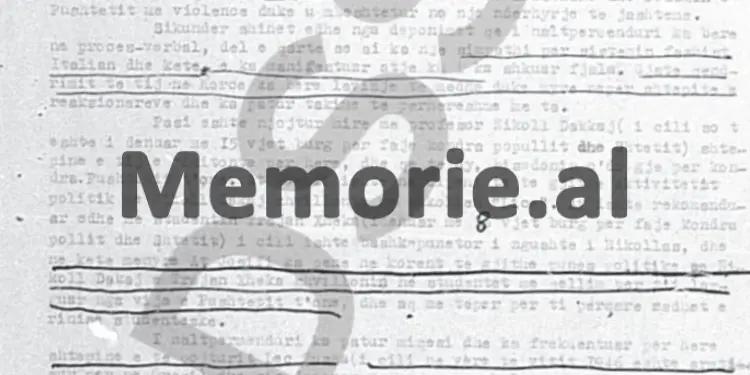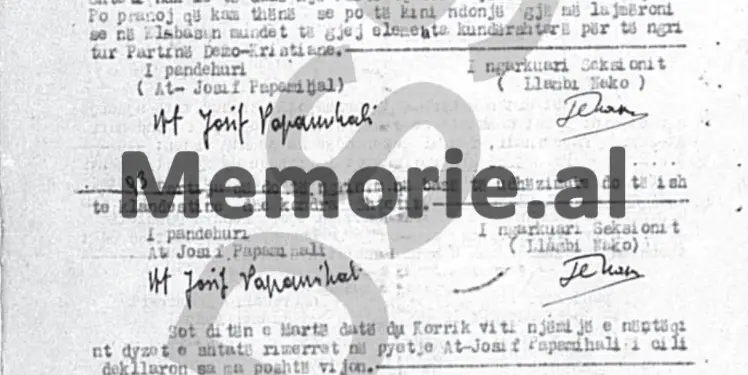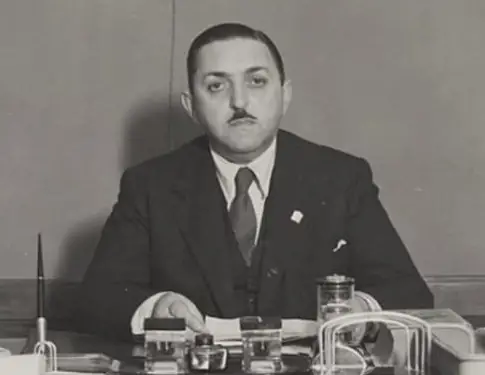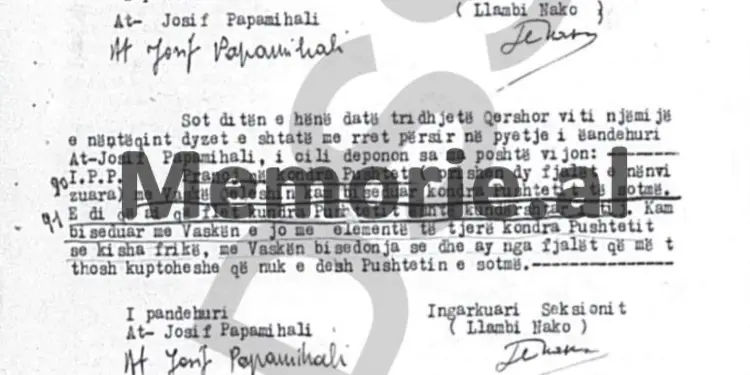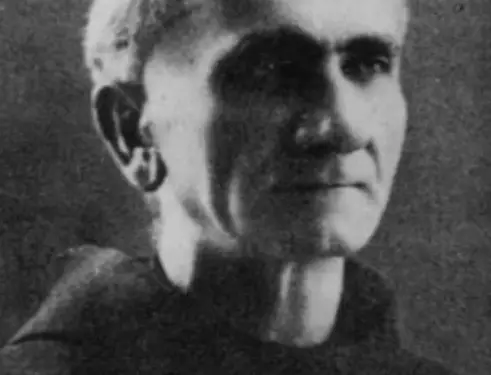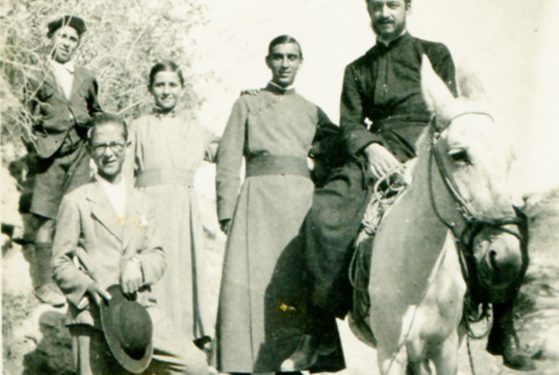By Dr. Mirela Sinani
Memorie.al/ Suffering: Father Josif Alqiviadh Papamihali, Catholic priest of the unitary rite. Father Josif Papamihali was born on September 23, 1912 in Elbasan, with Albanian citizenship and nationality. He completed primary school in his hometown, and high school in Italy at the religious gymnasium “Grotta Ferrata” near Rome. He was awarded a scholarship to study philosophy and theology at the Greek Pontifical College of St. Athanasius in Rome, graduating in 1936.
He went for 6 months to Lungro in Calabria, where he stayed with the Italian-Albanians there. Due to his education, he spoke and wrote in Italian, Latin, Greek, Albanian and a little French. As soon as he returned to his homeland, he began to exercise the duty of unit priest in Elbasan as an assistant to Pjetër Skarpel and then in Korça under the direction of Father Brunet, then in Berat, Lushnjë and Pogradec, until 1946, when again returned for 2 years to Korça. As a priest the unit belongs to the line of the Catholic Church, but not directly related to the Vatican. The unit church is led by the Albanian Catholic Bishop based in Durrës.
He was arrested by the State Security section in Korça, on October 31, 1946. At the end of the investigation and trial, he was sentenced as “enemy of the people”, with 5 years of imprisonment and forced labor. As a prisoner in Korça, he was taken to work in the Maliq swamp. There he was drowned in the waters and mud of the swamp. Father Josif Papamihali, along with other Catholic priests, was proclaimed by the Pope “Martyr of the Catholic Church” in 2016. His hometown, Elbasan, gave him the title “Honorary Citizen”, on November 5, 2021, on the 5th anniversary of declaration of martyrdom
Father Josif Alqiviadh Papamihali, born in Elbasan in 1912, is one of the Unite Catholic priests who, despite his very young age, only 34 years old, and with a very poor life, could not escape the communist program to crack down on the clergy. as powerful rivals with their authority in the people. The communists feared that they, through influencing the believers, could create powerful social upheavals, extremely detrimental to their power. On October 31, 1946, Father Josif Papamihali was arrested on charges that: With the arrival of Italian fascism in Albania, he manifested and sympathized with the occupier and was closely associated with priests, such as Father Bruneti, etc. After the liberation, the reactionary policy of the Vatican continued. He held meetings with reactionary elements and talked against the popular power, as well as held meetings with Catholic leaders to sabotage the elections of December 2, 1945, in order to create the Christian Democratic Party in Albania, etc.
Contrary to this accusation, the investigators’ notes on Father Joseph state that: during the occupation he remained indifferent. There are no relatives arrested or convicted. For a period of 9 months, Father Josif Alqiviadh Papamihali, was subjected to investigation with a series of frequent hearings. Suffice it to note the period before the trial, on August 1, 1947: May 21, May 22, June 16, June 30, July 2, July 23, 1947.
Punished for opinions, likes, likes and dislikes
“By law in religion it is forbidden for politics to be conducted by religious people. “My mission is to develop the people in the Catholic religion.” The 9-month duration of the investigation allows it to be suspected that the interrogation sessions were much more frequent and extended, in order for the investigators to extract the data they were interested in to support the accusation. On May 21, 1947, in the Additional Minutes of the investigation, Father Josifi testified about a meeting of priests in Tirana, in October 1945, among whom Pater Mëshkalla, Pater Gjadri, Pater Troshani, Pater Krama, two Franciscan priests, a total of 9 people , regarding the problem of whether they would go to the polls or not. There they agreed to ask the superiors above.
On May 22, 1947, in addition to the minutes of the investigation, the defendant Father Josifi, answering questions regarding the October 1945 meeting, stated: “Dom Shtjefën Kurti, Vicar of Tirana, said: After the voting is near “On December 2, I am of the opinion that we should vote, because for a long time, almost a motmot, is the state that governs the country and this government can be called legal due to the expiration of the deadline”. It was said at the meeting that, due to the critical situation that has been created for the Church, it is good to vote for the Front, even though the Albanian Communist Party was in charge, that even if there were others, they were under its influence. The problem was: “Should we vote for the Front, or not?”
Patër Krama spoke: A state is called legal when it receives the votes of the people and as long as it does not have the votes of the people, it cannot be legal, but it is illegal and the state needs these votes to be legal. Since the issue is on hold and the people have not yet voted, it’s good for us as Claire to abstain. The thesis was: Is it permissible for us religious people to vote for the people of the Front who were communists, atheists? Does religious morality allow cooperation with atheists? Father Gjadri says: “to abstain”; Father Isaac was against, so we should not vote.
Or the Accusations: … manifested and sympathized with the occupier. After the liberation he continued the reactionary policy of the Vatican; has met with reactionary elements and spoken out against popular power; held meetings with Catholic leaders to sabotage the elections of December 2, 1945, in order to create the Christian Democratic Party in Albania, to vote against the Front, as the people of the Front were communists; Father Mëshkalla and Father Troshani agreed with the theory that we should not vote for religious reasons; Father Mashkalla said: Let us not take this matter upon ourselves, but submit it to our superiors and let them guide us; Father Troshani said: We cannot wait for a decision from our superiors, as this is a free matter.
Father Troshani was to abstain. The two Franciscan friars were in doubt on the matter, but more were not to vote. The conversation raised the question of a Catholic Party: if we had one like in Italy, would the government accept that? We thought not. We charged Dom Shtjefën Kurti to go to the Bishop and submit all these to him, since he was the Parish Priest of Tirana, not that he was a mayor. … I told Dom jetefni to inform me in Elbasan about everything new, to find elements for the Christian Democratic Party, but the issue had to be legal, that is, it had to be recognized by the government. We also talked about getting our MP out of the Catholic Clergy, or out of Catholic people…!
I know about the Christian Democratic Party, which helps the Church. The Vatican helps this party, but I do not know if there were any in Albania. I learned from the newspapers that it was headed by the Jesuit priests of Shkodra. I do not know well about the organization of the Jesuits, but I know that Father Fausti was the foreign minister of the Jesuits and he has held this position before. I do not know anything about the Christian Democratic Party, I heard for the first time at the meeting we had in Tirana. From his statements about the meeting of some priests in October 1945, in connection with the elections of December 2, there are very interesting issues that are discussed, interesting in the practical sense of that time, but especially interesting from the theoretical point of view, raising questions about legitimacy of governance, for the dependence of the legitimacy of governance merely only from the formal aspect of time or from the substantive substance:
– The will of the people expressed through the vote; Questions are raised about the attitude towards the electoral process, opposition with abstention, voting against or not participating in the process at all, due to deep ideological and moral contradictions between the clergy and the communists, both religious and atheist. “I do not know well about the organization of the Jesuits…! I do not know anything about the Christian Democratic Party either, I heard for the first time in the meeting we had in Tirana “. In the investigative and judicial file of Father Josif Papamihali, attention is drawn to a series of “Additions of Minutes” with his short testimonies on the same sheet of minutes, consecutive for events and persons for whom he has previously testified, written one after the other without connection, but at the bottom of each page, there is also the signature of the defendant, Father Josif Papamihali, and the name and signature of the person in charge of the Section, Llambi Nako.
For example: In the Additional Minutes dated 16 June 1947, the defendant states: I told Vaskë Qelesh that from Shkodra there are fights between partisans and Security organs. The same sheet reads: Monday, June 30, 1947, the defendant is questioned … I talked to Vaska against the government, because he also speaks against. From his words it was clear that he did not like today’s power. Below is another deposition: The proposal to gather to discuss our position on the voting was made by Patër Troshani. In the same way follow a series of depositions, for example: Today, July 2, 1947, the defendant … states: I met the Archbishop of Durrës, Monsignor Prenushi. I told him that I would vote for the Front out of fear. The despot told me that: this is not good, that he did not agree with religious principles that the deputies were with anti-religious and atheistic principles. When I met the U.N.R.A. Englishmen, I spoke ill of the government. I said that there is no other party here than the Front led by the Communist Party…!
From the procedural point of view, in every record as a rule, the whole procedure should be noted: Question, answer, questioned and answered, etc. These “Minutes Additions” do not contain any questions. The wording in this way of “Additions to the Minutes” raises the suspicion that these additions were created specifically to fabricate some allegations of the defendant, which are then given the value of evidence to be used against him, as facts of his guilt. In the document “Ordinance. In order to expand the investigation, the defendant should be interrogated about his connections with his friend Lec Tusha ”, there is no date of issuance of the order, nor who issued it, nor to whom it is addressed. If this document is a page of minutes in implementation of an Order, it should have been written at the top that “in implementation of the Ordinance, dt …, no …, this investigation is being conducted as follows …”, but none of these have the document.
Below the title “Ordinance. To expand the investigation … “, as above, the document continues: Today, on 23/7/1947, the defendant Father Josif Papamihali, declares: I met Lec Tushë in the Catholic Church, where he came as a believer. We criticized foreign policy and ties with the Soviet Union and Yugoslavia, we wanted economic ties with the Anglo-Americans who are rich and could help our country. In such notes called minutes we find such statements, such as: I told Pope Isaac not to say that there were spies. He was an enemy of the government and the Communist Party, that it was turning the masses away from religion. His policy was for people to gather around the Church and religion. The anti-religious policy of the government was contrary to the line of our Church. The final report, contrary to the defendant’s depositions, states: “Although he slips into questions, it turns out that this (Christian Democrat) Party would be subsidized by the Vatican!The aforementioned, had meetings with the U.N.R.A., to whom he provided information to the detriment of our independence.
He complained to them why the Albanian government does not let them organize the Christian Democratic Party…! He has pursued a pro-fascist policy under the guise of the clergy since he came. Father Josifi visited the house of Lec Tushë, who fled in the summer of 1946 in Greece and together they criticized our power in economic and administrative policy. They do not call our alliance with Yugoslavia right, because this was a poor country and we had no economic benefit, while England and America are rich countries and they would help us…! “As a result of the process, it turns out that he was a Vatican agent in our country.” In the document of the Public Prosecution of the Korça Prefecture, with protocol number 45/3 that sends the processes to the Military Court for trial, to the Military Prosecution of the Diviz. VIII, here and the General Prosecutor’s Office (Security Directorate), is included an 11-page report against the defendant who is accused of political activity against the popular power, having links with anti-government elements, especially the Catholic clergy, who had the aim is to organize the Christian Democratic Party and overthrow the government by force, relying on an external intervention “.
On August 1, 1947, on Friday, at 10 am, according to the minutes of the Military Court, Korça, with no. act 176, no. decision 155, the Military Court in Korça, being almost military prosecutor Aranit Çela, convened to begin the trial against Father Josif Alqiviadh Papamihali, a priest by profession. The defendant, Father Josif Papamihali, is defended in court by lawyer Kristaq Pilika. In the minutes of the trial, in his statements, Father Josifit states: “By law in religion it is forbidden for politics to be conducted by religious people. My mission in Albania is to develop the people in the Catholic religion. “We criticized foreign policy and ties with the Soviet Union and Yugoslavia. We wanted economic ties with the Anglo-Americans who are rich and could help our country.”
The claim of the Military Court in Korça, far from being a document that speaks with facts and evidence in terms of law, is openly expressed in a propagandistic way, with a journalistic style, full of pathos, incites prejudice and feelings of hatred. The claim resembles a propaganda leaflet of the ideas of the communist side, against the other side having ideologies opposite to it. For the first time in the post-war courts, the phenomenon of imposing criminal sentences on the opinions expressed, influences, encouragement began, the legal concept of immediate cause-and-effect relationship was destroyed, establishing links between opinions, people’s opinions, ie not the facts, on the one hand, with the political acts of the occupying governments or the fascist system.
This claim proves that the trial and condemnation of priests and clergy in general was no longer something strange, unseen and unheard of before, nor even a coincidence. With the coming to power of the communists, the crackdown on clerics in public in the courts became a common, programmed, and systematic phenomenon. In the Claim of the Military Court of Korça, it was stated: “The defendant has done nothing but, faithfully followed the anti-popular policy of the Catholic Clergy, a policy that has its arsenal in the Vatican. The appearance of Father Joseph and the other priests in court is not strange, it is not spontaneous for the people, it has become something common and that would come naturally as a result of the policy that they all follow. Father Joseph himself, before the court, defended the Vatican, not condemning his actions, defended Father Antony and other convicted clergy, giving different opinions about their work….! He worked hard for the reaction, encouraged the reactionary elements and caused some ignorant and fanatics to lose the toruan for a while… even the unitary religion preached by Father Joseph, was a tool of fascism to connect the people with the Vatican and consequently with fascism”.
The Military Court of Korça, at the end of the trial, on August 6, 1947, found him guilty. The minutes state: The court declares the guilt of the defendant as: “Enemy of the Albanian People and the Democratic Power” and in accordance with the law decides the sentence of Father Josif Papamihali with 5 years of imprisonment and forced labor for so long and with loss of of political and civil law at the time of punishment. Even the High Military Court, on October 3, 1947, despite the appeal by Father Josif Papamihali himself, who asked for the sentence to be reduced to the minimum provided by law, upheld the decision of the Military Court in Korça. Father Josif Papamihali, a prisoner, was taken to the infamous Maliqi swamp camp. There, along with hundreds of other convicts, he was forced to work to drain the swamp. From the blows he remained in the mud and did not rise again. His body disappeared into the mud of the swamp. Among the dozens of others who lost their lives in the Maliqi camp, even the martyr Josif Papamihali, the whereabouts of his remains are unknown. Memorie.al




